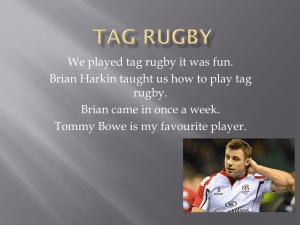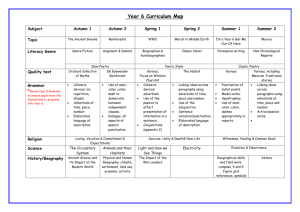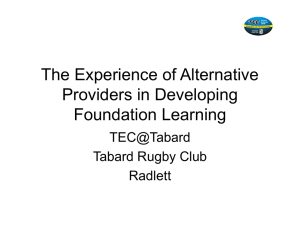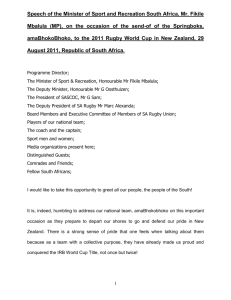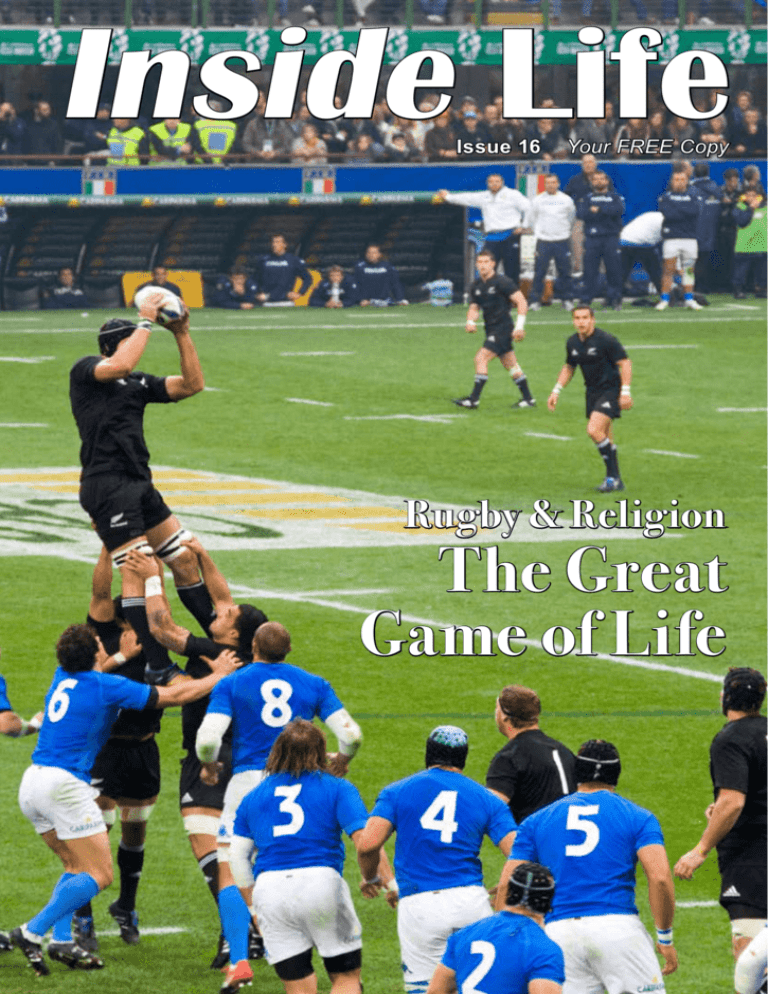
Inside Life
Issue 16
Your FREE Copy
Rugby & Religion
The Great
Game of Life
Inside Life
A Magazine of Understanding
Number 16, February 2012
CONTENTS
The Great Game of Life. . . . . . . . . . . . . . . . . . . . . . . . . . .
3
Christians Who Play Rugby . . . . . . . . . . . . . . . . . . . . . . . .
5
Six Leadership Punctuation Points . . . . . . . . . . . . . . . . . . 7
Faith on Prescription . . . . . . . . . . . . . . . . . . . . . . . . . . . . .
Mateship: Imago Aussie? . . . . . . . . . . . . . . . . . . . . . . . .
10
Speed Bumps, Stepping Stones, and Rock Walls . . . . .
12
Have You Brightened Anyone’s Day Recently? . . . . . . .
14
You Better Slow Down. . . . . . . . . . . . . . . . . . . . . . . . . . .
15
Inside Life
PO Box 304055, Hauraki Corner, Auckland 0750
Phone: 09 489 8910
Email: insidelife@wcg.org.nz
Website: www.insidelife.org.nz
Editor: Rex Morgan
Graphic Design: Philip Baldwin
Printed by Inkprint Ltd
Inside Life is a magazine of understanding. Rather than
just reporting on life, Inside Life seeks to delve inside the
marvellous mystery that is life, to discover what it is all
about. What does life mean? Where did it come from?
How can we make the most of it?
Inside Life provides insight and answers to life’s deep
questions and challenges, and aims to provide articles
of lasting hope, help, and encouragement for successful
living in today’s fast-moving world.
Inside Life is published three times a year, free of charge,
as a community service.
© Worldwide Church of God 2012. All rights reserved.
ISSN: 1177-3693
2
9
This Issue: Last year New Zealand hosted a highly
successful and memorable Rugby World Cup tournament. The matches were played and followed
with a level of devotion verging on religious fervour.
Our lead article examines parallels between rugby
and religion, and considers how some aspects of
the game with the oval ball can be used to inform
‘play’ in the much more important game in which we
all participate—the ‘game of life’.
Cover & p. 5 p. 3
p. 4
p. 6
p. 8
p. 9
p. 10
p. 11
p. 12
p. 13
p. 14
p. 15
Photo Credits
dreamstime_xxl_11797410
dreamstime_m_19659136
dreamstime_xl_21731783
dreamstime_m_2485093
iStock_000016839684Medium
dreamstime_m_20598264
Photo courtesy SACFS Promotions Unit
Photo courtesy DCS Queensland
dreamstime_xxl_20315604
dreamstime_l_7128527
dreamstime_m_3288521
iStock_000005339038Large
Inside Life, Issue 16
Rugby and Religion:
The Great Game of Life
By Rex Morgan
F
or an exciting, exhilarating
six weeks, New Zealand was
gripped by Rugby World
Cup fever. Hordes of loyal fans
converged on packed stadia, huge
crowds gaped at giant screens in
fan zones, tourists criss-crossed
the country in campervans, pubs
burst at the seams, flags and
bunting magically sprouted up
everywhere. It was six weeks of
‘rugby heaven’.
‘Heaven’ is an appropriate description, in view of rugby’s oft-observed
status as the ‘unofficial state religion’
of New Zealand. And indeed rugby
can be compared to religion in many
ways.
Expensive grandstands soar into the
air like cathedrals. Crowds of ‘disciples’ fill the ‘pews’, rising in unison
to the Mexican waves and exulting
at the thrilling plays. Punters coming
from all over the world to view the
matches are like pilgrims visiting holy
sites, the ‘hallowed turf’ of famous
grounds like Eden Park (a modern
day ‘Garden of Eden’?). National
anthems are sung with the stirring
devotion of hymns of praise. The
battle is intense; the fields are ‘sprinkled with the sacrificial blood of the
martyrs’. Top players and heroes of
the past are adored like saints. The
Webb-Ellis Cup is sought as desperately as the Holy Grail.
A painting of Jesus as an All Black
was displayed at Wellington’s
Cathedral of St Paul during the tournament. Artist Don Little said that he
had painted the piece after wondering
Inside Life, Issue 16
whether rugby had become the new
religion in a country that had largely turned away from the faith. An
Australian rugby fan purchased the
1
picture.
Religious historian Professor Peter
Lineham, speaking to Kim Hill on
national radio summed it up succinctly: ‘Rugby is not just a game. It’s a
2
religion’.
It is interesting to note also that New
Zealand is by no means alone in this
regard. A quick Google search shows
people in South Africa, Australia,
Ireland, Wales, England, and France
have also likened the game with the
oval ball to a national religion!
Notre Dame du Rugby
One remarkable example of the
religious overtones associated with
rugby is found at a chapel in France
called ‘Notre Dame du Rugby’.
The church is decorated with
hundreds of rugby shirts in glass
cabinets. Four stained-glass windows
feature images of the Virgin Mary in
various rugby poses, including a lineout, a scrum, and a cradling of the
infant Jesus with a rugby ball in his
hands. A framed prayer at the altar
translates into English:
Virgin Mary, who taught your
child Jesus to play at your knee,
keep a maternal watch over
the game of these grown-up
children.
Be with us also in the great
scrum of existence, so that we
may come out winners in the
great game of life, giving an
example—as on the field—
of courage, zest and team spirit,
in the word of an ideal in your
name. Amen.
References to ‘the great scrum of
existence’ and ‘the great game of life’
can serve to move our focus from the
limited arena of the game of rugby to
the far more important issue of life in
the real world.
While rugby is spectacular, having its
triumphs and challenges, in the end
it is ‘just a game’, providing only a
temporary escape from the serious
business of life. When it comes to the
business end of life, rugby doesn’t
have the answers we need.
3
Richie McCaw, All Blacks captain, is all smiles as he stands with the Webb-Ellis Cup, the trophy awarded to the
winner of the Rugby World Cup.
It was wonderful to see the All Blacks
win the coveted trophy, but in four
years’ time the prize will be up for
grabs again. This is one aspect where
religious faith promises so much more
than sport. Rugby games are over all
too soon; wins are recorded, but the
teams must play again. The glory of
victory soon wears off, as it is eventually followed by inevitable defeat.
Christianity, on the other hand, has to
do with eternal, spiritual things, and
promises lasting benefits—a trophy
3
that will ‘never fade away’.
Don’t get me wrong—rugby is
wonderful as recreation. It is an exciting diversion that is rightly played with
vigour and followed with passion. The
Rugby World Cup was a series of
wonderful spectacles that enthralled
and inspired the nation—’the stadium of 4.5 million’. But wasn’t it only
a diversion from the real business of
4
life? The fervour of sports conquest
soon wears off in the cold hard light
of issues like economic uncertainty,
relationship problems, crime, education, and natural disasters.
To face these aspects of life we need
something more substantial than a
game in a sports stadium. We need
a power that plays out in the stadium
of everyday life.
We read about a power that does just
that in the Holy Bible. And believe it
or not, the Bible itself makes close
comparisons between sports events
and religion. It shows the way that
principles learned in physical sports
like rugby can be utilised in our
everyday living. Of course, rugby
was unknown at the time, but the
Bible highlights examples from the
sports of the day: boxing, wrestling,
and athletics.
Rugby Strategies Applied to Life
The New Testament writer Paul
brought out the principle that while
there are many competitors in a
running race, only one can be the
4
winner. He recommends we should
all live the whole of our lives in such a
way as to win a prize. And he points
out a welcome difference between
sport and life: in the game of life
there is no limit on how many people
can be winners.
Paul suggests we should all learn
lessons from the strict training that
athletes undertake. Players are willing to spend many hours each week
in rigorous workouts in the quest to
represent their country in a rugby
game. Shouldn’t this inspire us to put
our own great effort into living life in a
moral and honourable way, endeavouring to show love to all around us,
to help and serve others, and to build
lasting relationships?
Inside Life, Issue 16
Christians Who Play Rugby
Nineteen sports chaplains were in attendance at the Rugby World Cup to offer pastoral care, a quiet prayer, or simply
a cup of coffee. Dave Chawner, British coordinator for Rugby Union Chaplaincy stated: ‘At least 25% of the squads
1
involved in the tournament had some sort of regular prayer and/or Bible study’.
A surprising number of international rugby players are committed Christians. The legendary Michael Jones, widely
recognised as one of the greatest players of all time, was so committed to his faith that he even refused to play
games on Sundays. Jones says: ‘Although I am truly honoured to represent New Zealand on the rugby field, my first
allegiance is definitely to my Lord and Saviour, Jesus Christ. People easily forget a player after he stops playing, but
one thing I’d like to be remembered for is that I was a person who put God first before rugby’.
Once asked how a Christian like he could be such an uncompromising tackler, Jones famously quipped back with a
Bible principle: ‘It is better to give than to receive’!
One of the crowd favourites of the World Cup-winning All Blacks was Brad Thorn. He is another legendary figure, a
‘dual international’ who has played both rugby league for Australia and rugby union for New Zealand. Thorn became
a Christian after asking a fellow team mate (Kangaroos front-row forward Jason Stevens) on a trip to the UK in 1997
why he didn’t get involved with all the money, girls, and alcohol that come with top level rugby league.
‘Jason stood out from the rest of the team’, Thorn said. ‘On tour we would cut loose and he didn’t. When you are in a
group, everyone says you are weak to not go on the beers, weak if you haven’t slept with a woman. It’s the opposite.
Character is involved.’
Christianity doesn’t prevent this big man from highly physical performances where he delivers bone-crushing tackles
and aggressive driving charges. ‘Before I play, I say a simple prayer, honouring God through the way I play, 100%
aggression and physicality, but showing respect to your opponent afterwards whether I win or lose.’
Comparing rugby and religion, Thorn says: ‘The things that help you be successful in football are to be humble,
because that’s how you learn; to persevere; to sacrifice for others, because the team’s more important than yourself;
to show courage; to show wisdom; and to be honest with your teammates. All of these things that are Christ’s real
2
nature seem to be the key things that make you successful in football’.
Another player in the 2011 World Cup, Springbok Pierre Spies, shared his story in a recent book, More Than Rugby.
One of the most imposing and explosive loose forwards that South Africa has ever produced, Spies makes no secret
of the personal importance of his Christian faith. On his website he states: ‘My message to you is that God has a plan
for your life. He has a passion for you. Once you have decided to follow Him and live for Him, He will do more for you
than you ever could have imagined’.
Inundated with invitations to appear as a guest speaker, Spies uses every opportunity to inspire young and old, not
with talk of sport, but of life, faith, family, and love. He married the girl of his dreams, Juanne, in December 2008 and
3
their dedication to Christ and Christian values serves as an example to young and old alike.
Scottish representative in the 2007 and 2011 Rugby World Cups, Euan Murray is another player who has put his faith
first and sport second by declining to play on Sundays. ‘There is something far more important in life than the result
of a game’, he says.
These and many other players make no secret of the fact that they are devoted Christians, and that their religious
faith has helped them not only in the arena of rugby, but much more importantly, in the great game of life.
Notes
1
2
3
Challenge Weekly, 31 October 2011, p. 3
Challenge Weekly, 29 August 2011, p. 16
www.pierrespies.co.za
Inside Life, Issue 16
5
opportunities, and viewpoints. Only
by fitting in with others can we play to
our best in the great game of life.
Paul cites the humorous illustration
that if all of our body was an eye or
an ear, for instance, how would we
9
be able to eat or walk?
Similarly, not everyone in a rugby
team can be the goal kicker. Some
of the All Blacks are forwards, some
are wings, some are kickers, some
sit out a game on the bench, but
they all have their part to play in the
team. We have our individual part to
play in the game of life, and can help
ourselves and others by being willing
to tolerate and assist those who are
different from us.
One of the Bible writers uses the
image of spectators watching an
athletic contest to spur his readers on
5
to living a life free of sin. Paul told his
young co-worker Timothy that physical exercise benefits the body for a
short while, but godliness—focusing
on the ethical, moral, and spiritual
aspects of life—is much more worthwhile because it brings promise of a
better life beyond the grave, as well
6
as benefitting our life right now.
How can we have victory in the spiritual game of life? The Bible’s answer
is to look towards Jesus, the great
champion who showed us the way to
7
eternal life.
Just as the All Blacks have a captain
who leads from the front, Richie
McCaw, so Jesus is a pace-setting
spiritual leader—‘the captain of our
8
salvation’.
Another sporting principle expounded by Paul is that of teamwork. The
All Blacks display a blended mixture
of players of different types. The
nimble, speedy back line works in
unison with the heavier, more solid
forward pack, each player using his
special skills for the benefit of the
whole team. Similarly, in society at
large, people have differing abilities,
6
It was wonderful to see how New
Zealanders as Rugby World Cup
hosts supported the teams from other
countries. Kiwis not only encouraged their own team, but warmly
welcomed visitors from other nations
and proudly displayed a variety of
national flags. One of the primary
teachings of the Bible is that humans
10
are all one in God’s sight. How
wonderful if we were as generous
and accommodating of others in all
of our relationships, not just at Rugby
World Cup time!
World In Union
The admirable sentiments called up
in the Rugby World Cup theme song,
‘World in Union’, are strikingly similar
to those found in Christianity:
Gathering together,
one mind, one heart
Every creed, every colour,
once joined, never apart
It’s the world in union,
the world as one
As we climb to reach our destiny,
a new age has begun.
This could easily be a hymn sung in
church. And indeed, that is a more
likely place than a rugby field for
these aspirations to be brought to
their ultimate fulfilment. Christians
aim to practice a life expressing
values such as generosity, justice,
truth, honesty, integrity, and love.
These are characteristics of the
nature of God, who selected us all as
participants in the great game of life.
He gave us a coaching manual, the
Bible, to show us how to ‘play’. The
game plan God lays out for us there
opens up an understanding of life
that rivals, and even surpasses, the
thrill of rugby games. And it is capped
off at the end with the golden trophy
of eternal life.
If you would like to learn more about
the joy of participating in the spiritual
game of life, why not visit a church
this weekend? Or, please feel free to
11
write to us for more information.
Wouldn’t it be great if we could all
pay as much attention to the ‘great
scrum of existence’, the ‘great game
of life’, as we do to a comparatively
short-lived and insignificant game of
rugby!
This would truly make the world a
better place.
Notes
1
Challenge Weekly, 10 October 2011
2
Interview on Radio NZ National, 24
September 2011
3
1 Peter 5:4 (All scriptures from NIV unless
stated otherwise.)
4
1 Corinthians 9:24
5
Hebrews 12:1
6
1 Timothy 4:7-8 (KJV)
7
Hebrews 12:1-2
8
Hebrews 2:10 (KJV)
9
10
11
1 Corinthians 12:12-18
Galatians 3:28
Write to Inside Life, PO Box 304055,
Hauraki Corner, Auckland 0750.
Rex Morgan, the
editor of Inside
Life, and his wife
Marilyn live on
Auckland’s North
Shore. Rex has
worked in Christian
ministry and office
administration for
over 30 years and
has contributed articles to a number of
international publications.
Rex can be contacted at rex@wcg.org.nz .
Inside Life, Issue 16
By Aub Warren
P
unctuation is an essential—
if not always consciously
applied—part of our daily
communication. When we write,
Being clear about
commitments,
completion, and
conclusions
is
equally essential for clarity in
leadership.
Six!
Leadership?
Punctuation,
Points:
er its influence over the meaning
Of course, not
every leadership
commitment can
be carried out
with a simple
start and stop.
And so we have
the comma.
of this sentence: ‘At various times
The Comma
he ascribed his success to his
This sometimes
bedevilling little mark has three
essential roles: to separate introductory information in a sentence, to
separate items in a list, and to insert
explanatory or detailed information within a sentence. A tiny mark,
but one whose placement—as our
‘parents, Jean and God’ example
above highlights—can considerably
alter meaning.
those little dots, dashes, curls,
capital letters, and other marks
all provide powerful meaning and
direction. (And if you doubt the
power of a simple comma, consid-
parents, Jean, and God’ versus
‘At various times he ascribed his
success to his parents, Jean and
God’)!
Punctuation isn’t complicated, but it
does exercise great power through
the direction it provides and the meaning it helps create. And of course, the
lack or misuse of punctuation creates
confusion and misunderstanding—
a little bit like leadership.
Let’s consider just six elements of
punctuation—in this case as their
principles might relate to leadership.
The Capital Letter
Capitals signal the start of a
sentence. They also show respect
for the names of people and places.
Capitals give prominence. Leaders
also give prominence by what (and
who) they capitalise, what they show
respect for, and where they choose
to start things. Starting, naming, and
focusing are everyday ways in which
leaders ‘punctuate’ their mission,
their methods, and their meaning.
The Full Stop
It brings a sentence to a close.
‘Enough of that, let’s move on to
something else’, it says. As a general
rule, the closer a full stop is to the
start of a sentence, the easier the
sentence is to follow and understand.
Inside Life, Issue 16
It’s important for leaders to be able to
clearly connect and separate related
events, activities, and issues—like
items in a list. It’s also vital to give
context to what you’re asking: providing introductory information, if you
like, before articulating the specific
request. And sometimes there are
qualifying or clarifying directions,
explanations, or requirements to be
communicated.
Just as the comma is perhaps the
most frequently misused punctuation
mark, so too leaders can misplace,
misuse, or mistime pauses and
comments. More information is not
necessarily better communication.
The Colon
There are also three key ways the
colon is used: to introduce a word or
phrase that serves as explanation,
clarification, summary, or interpretation; to introduce a list; and to formally
introduce a quotation. Colons illustrate and amplify.
Leadership is punctuated with colons
when we clearly establish, explain,
and enumerate. There’s a sense of
order and rationale that a simple,
clear list of ideas or explanations
provide.
The Question Mark
The question mark is one punctuation point that probably needs more,
rather than less, use in our workplaces—particularly in leadership.
It invites a response, encourages
engagement, and indicates an
expectation of contribution.
‘When we become leaders, we feel
that it is important for us to have
answers rather than questions’, writes
Michael Marquardt in Leading with
Questions (2005). ‘The ability to ask
questions goes hand in hand with the
ability to learn. A learning organisation is only possible if it has a culture
that encourages questions.’
The Spanish language does the
question mark particularly well, placing an upside down version of it at
the start of the sentence. This lets
the reader know up front that what’s
being said is a question, rather than
requiring them to wait until the end
of the sentence for that important
context to be revealed.
¿It’s great, don’t you think? Perhaps
there’s something in that for leadership communication, too.
7
• Leaders must carefully and clearly
provide introductory information, separate issues and, as necessary, insert
additional information.
• Leadership is about providing a
sense of order and rationale by clearly
and simply establishing, explaining,
and enumerating.
• Leaders must ask and encourage
questions. ¿What difference could that
make?
• Leaders are expected to occasionally and appropriately exclaim their
surprise, appreciation, emotion, disapproval, and enthusiasm (!).
Punctuation printing blocks for a vintage letterpress in a small wooden
typesetter box.
The Exclamation Point
Finally! The exclamation point
conveys surprise, anger, strong
emotion, or enthusiasm. While most
business writing should be free of
exclamation points (and exclamations!), they can add appropriate
meaning in informal ways (e.g., note
the difference between emailing
someone ‘That’s great’ versus ‘That’s
great!’).
Two things about exclamation points
and leadership: it’s important to
occasionally and selectively signal
appropriate
surprise,
appreciation, disapproval, or enthusiasm by
exclaiming; and, the more you do it,
the less impact it has—just as it does
in writing.
So that’s the free punctuation lesson
(and also a chance to shamelessly
promote my fantastic half-day ‘Writing
for Results’ workshop, but I’ll refrain
from an exclamation).
In summary, the six punctuation
points of leadership remind us that
(colon):
• Leaders should carefully identify what gets capitalised so it’s clear
8
what the starting point is and who
the key identities are.
• Leadership is as much about
stopping as it is about starting (and
you have to stop before you can
start—just like a sentence).
The point is, leadership requires
appropriate punctuation—otherwise
leadership can feel like an awfully
long sentence for followers. So, how
will you punctuate your leadership
opportunities?
© Pacific Training & Development, 2011. Used
with permission.
For more information about leadership and
team development, communication training
or accredited coaching go to www.pacific.
qld.edu.au or call 00617 5553 6060.
Situational Leadership® is a registered
trademark of the Center for Leadership
Studies, 230 West Third Ave., Escondido,
CA 92025. www.situational.com. All rights
reserved.
You are invited to come and meet the sponsors of
Inside Life!
Worldwide Church of God services are held weekly in the following locations:
Auckland: The Mt. Eden Senior Citizens’ Club Hall, Balmoral
(corner Dominion Rd and Brixton Rd)
Saturdays at 2.00 pm.
(contact: Rex Morgan, ph. 09 489 8910)
Rotorua: Contact Peter Lindop, ph. 07 349 2272
Wellington: Thumbs Up
5 Elizabeth Street, Petone
Saturdays at 2:30 pm.
(contact: Dennis Gordon, ph. 04 386 2094)
Invercargill: The Southern Light Community Centre
64 Conon Street
Saturdays at 1:00 pm.
(contact: Les Evans, ph. 03 216 3680)
Other NZ locations: Small groups meet regularly in other cities
nationwide. For details, contact Dennis Richards,
ph. 06 353 6224 or visit www.wcg.org.nz .
Inside Life, Issue 16
Faith on Prescription
By Joseph Tkach
S
ome atheists claim that
belief in God is immature
and subjective. They say
that religion is for the hesitant, the
guilt-ridden, the excessively timid,
and those lacking clear convictions with which to face life. Some
of these atheists even see religion
as a cause of mental and physical
illness. But a recent study done
by the British charity, Christian
Medical Fellowship, known as the
CMF, showed otherwise.
Research suggests that faith is associated with longer life and a wide
range of physical and mental health
benefits.
Drawing on evidence from more
than 1200 studies and 400 reviews,
this study showed that, far from
being bad for health, being a practicing Christian can have significant
benefits to both physical and mental
well-being.
Moreover, evidence from these
studies and reviews has shown an
association between a life of faith
and a number of positive health
benefits, including: protection from
illness, coping with illness, and faster
recovery from it.
In fact, of all the studies reviewed,
81 percent showed benefit and only
four percent showed harm. The
four percent were among religions
who refuse vaccination and blood
transfusions.
So what particular health benefits
were identified in the report?
Here are a few:
• increased well-being, happiness
and life satisfaction,
Inside Life, Issue 16
• lower rates of
depression,
• less anxiety
(and related
illnesses),
• lower rates of
alcohol and drug
abuse, and
• better adaptation to
bereavement.
One study of
21,204
adults
showed
that
those
who
attended church
regularly had a
life expectancy
up to fourteen
years longer than
those who did
not.
The report goes
on to suggest that
modern doctors
need to listen to
their
patients,
‘who typically are
more
religious
than their carers
[caregivers]’. It suggests that doctors
support spiritual care, because at a
time of illness, spiritual issues often
rise to the surface—questions of
personal worth, mortality, and place
in the world—questions only faith
can answer.
There are strong links between
emotional and physical health.
Even though faith can have a
very positive influence on health,
Christians should not claim that
their faith is a guarantee of good
health and well-being. That is not
always the case. The gospel is not a
‘name it and claim it’ message about
health and wealth. The gospel is
about spiritual health and well-being.
Christians should not claim that belief
in God is a guarantee of good health.
But they can point out that the claim
some atheists make about belief
in God being bad for your health is
simply not borne out by the facts.
The CMF report concluded that in
contrast to the idea that the Christian
faith is bad for your health, research
suggests that faith is associated with
longer life and a wide range of physical and mental health benefits.
This is a transcript of a weekly ‘Speaking
of Life’ radio programme by Joseph
Tkach, president of Grace Communion
International.
For more information visit www.gci.org .
9
Mateship: ‘Imago Aussie’?
By Kerry Gubb
A
few years ago a book was published about Australia,
called The Lucky Country. Although the term found
its way into our self-talk, we haven’t been feeling
so lucky lately. Early in 2011, in just one month:
• Flash floods inundated an area
the size of France and Germany
combined. Lives were lost, homes
and crops destroyed.
• Cyclone Yasi ploughed across the
Barrier Reef and the Queensland
coast, leaving devastation in its
wake.
• Raging bushfires took out homes
and property on the edge of Perth.
It was a reminder that Australia is
not a passive, easily tamed land.
But when it does its worst to us, it
seems to bring out the best in us. It
also reminds me of why I’m so proud
of my people.
Disasters tend to awaken the smouldering embers of the exocentric
image of God in us.
‘We’re Aussies: we stick together’
is felt, spoken, and lived out every
time this unbroken mustang of a
land fights back with fire, wind, or
water. It’s a national psyche we call
‘mateship’. Mateship is our word for
a phenomenon highly influenced by
our land, our accumulated culture,
our history, and our experiences
together. Mateship is the ‘Aussie
spirit’. It’s the Aussies’ self-image:
‘imago Aussie’. If you ever visit here,
you’ll probably find yourself called
‘mate’ by total strangers. Consider it
a compliment.
Uniquely Australian?
Volunteers from the South Australian Country Fire Service are among the
Aussies who willingly help out their mates in times of disaster.
10
I’m as fiercely proud of mateship as
anyone. I have to disagree, however,
with some who think it’s unique to
our country. We might be more open
about it, but Australians are not the
only ones who come together in a
crisis and rise to the challenge of a
natural disaster. Each nation, each
community, neighbourhood, family,
and couple has its own variation on
the same broad theme. They might
call it something else, and they will
Inside Life, Issue 16
display it in ways that reflect their own
history, culture, and experience. But
mateship is common to all who are
made in the image of God. Because
God—Father, Son, and Spirit—is
mateship: relationship, community,
communion. God is whatever words
we use in our own languages and
cultural contexts to convey the
concept of ‘You are in me and I am
in you. We stick together. I will never
1
leave you, nor forsake you’.
Here’s the difference, though. That’s
how God is all the time. Always has
been, always will be. Outgoing love:
an orientation that Tom Smail, with
the help of Pannenberg, calls ‘the
2
exocentricity of our humanity’. We’re
not like God all the time. In fact,
we’re not like him most of the time,
are we? That’s because in us the
image of God (imago dei) is distorted
and hindered by our self-centred,
egocentric orientation. Only in rare
moments does ‘the exocentricity
that constitutes our humanity’ break
‘through the egocentricity that defies
3
and denies it’.
So for most of the time, we live
egocentrically, giving little thought
for community, while doing our own
thing, enabled by our egocentric,
individualistic, materially affluent life-
style, and unaware of the family two
doors down on our street.
food, and go door-knocking after the
Christchurch earthquakes.
Until there’s a flood.
I’m fiercely proud of the way my
people have responded to the
unprecedented natural disasters of
the last few months. Why shouldn’t I
be? I’m an Aussie. I can’t help reflecting, though, that such outgoing,
‘exocentric’ community spirit comes
not just from the fact that we are cast
from an Australian mould, but it is
something we share with all humankind. The Son of God didn’t just make
4
us —he became one of us, and still
is, and it is in him that all of us ‘live
5
and move and have our being’.
Until there’s a cyclone or hurricane
Until there’s a fire.
Disasters are just that. Nobody enjoys
them. But they do tend to awaken the
smouldering embers of the exocentric image of God in us. That’s when
we might just think that the family two
doors down might need some help.
And in the briefest of time, from a
street full of proximate but functional
strangers, emerges a new entity: a
community of friends—mates—lending each other a hand.
There were countless comments
from the grateful owners of flooded
and wind-ravaged homes about how
overwhelmed they were to have
people they’d never actually met,
helping them clear out the rubble
and restore their lives. It was incredibly uplifting to see it. As it was in
the wake of Katrina and Ike. As it
was after the California wildfires and
the Haiti earthquake. As it was after
the Boxing Day tsunami, or as the
world held its breath for the trapped
Chilean miners. As it was when the
Student Army, the Farmy Army, and
heaps of Cantabrians ‘mucked in’ to
help shovel liquefaction, distribute
Mateship, when all is said and done,
may be not so much ‘imago Aussie’
as it is imago dei—the fact that we
are made in the image of the Triune
God himself.
This article was first published in the AprilMay 2011 edition of Christian Odyssey
(www.gci.org/publications/odyssey).
Kerry Gubb is a minister who lives in
Brisbane, Australia.
Notes
1
2
3
4
5
See Hebrews 13:5
Tom Smail, Like Father, Like Son: The
Trinity Imaged in Our Humanity (Grand
Rapids, MI: Eerdmans, 2005) p. 123
Ibid., p. 124
Colossians 1:15-17
Acts 17:28
Queensland State Emergency Service volunteers are trained to rescue their ‘mates’ from rising flood waters.
Inside Life, Issue 16
11
Speed Bumps,
Stepping Stones,
and
Rock
Walls
By Gael McInnes
D
o you know what speed
bumps, stepping stones,
and rock walls have in
common? They all have something
to teach us about the challenges
of life.
Recently, I took what I thought was
a short cut across town and drove
down a street that had nine speed
bumps on it. Nine speed bumps! Not
such a short cut after all.
Sometimes we come across frustrating ‘speed-bumps’ on the road
of our everyday lives. How do we
respond to these? Do we curse the
people who put them there, stop and
go no further, or even turn around
and go back? The ‘road that seems
right’ may offer us many options and
require few sacrifices. Easy choices,
however, should make us take a
second look. We can ask ourselves:
‘Is this solution attractive because it
allows me to be lazy, doesn’t ask me
to change my life-style, or requires no
moral restraints?’ Often right choices
require hard work and self-sacrifice.
Be careful of short cuts; they can
1
lead to trouble.
At times we might need to slow
down, look back to see where we
have been, check out decisions we
have made, and perhaps get a new
perspective on our situation.
Stepping stones are similar to speed
bumps. I have done a lot of bush
walking and tramping over the years,
and I loved to challenge myself jumping from stone to stone over streams.
I would eagerly start out stepping on
stones within my stride, until suddenly I would approach one that was just
too far away. This made me stop,
survey the stream, and sometimes
12
backtrack to find another route. Other
times I slipped on slimy stones in my
eagerness.
There are many ways to get to our
destinations in life. It may mean
stopping, reviewing, ‘recharging our
batteries’, and perhaps moving in a
totally new direction. Life’s like that.
Sometimes we jump too quickly to
conclusions about situations and
people that can lead to lost opportunities, ruined reputations, and broken
friendships—even divided families.
Don’t be too quick to rush into the
2
unknown.
Have you ever tried rock climbing?
It’s challenging, scary, fun, and yes,
I’ve done it: not on an artificial rockclimbing wall, but up a real rock wall
out there in the mountains. There are
many ways up a rock wall. You have
to keep three limbs attached at all
times. Even though you are hooked
up to a safety harness, the challenge
is to reach the top safely.
You carefully survey the rock wall,
looking for protrusions to either grasp
with your fingers, or anchor with a
foot. Sometimes that protrusion is
just out of your reach, but you stretch
until your body feels as though it’s
going to split, and then you grasp it.
Now splayed against the rock wall,
gasping for breath and with every
muscle twitching, you have to do it
again, and again, and again, until
you reach the top. The reward? The
view, a great sigh of relief that you
made it, and of course, the exhilaration of abseiling down.
Whatever your life challenge is at
present, take heart from a man
named Paul. This early follower
of Jesus Christ was persecuted,
flogged, and imprisoned several
times for his Christian faith, and even
shipwrecked once. He survived the
‘storms’ that life threw at him and
made the most of every situation he
3
was in.
Paul would ‘take stock’ and look
around. When thrown into the
dungeon, he didn’t get disheartened.
No! He looked around to see how he
could be of use to his fellow prisoners.
There was another way to look at his
Inside Life, Issue 16
life and circumstances. Paul also
looked back. He looked at the
way he had negotiated failures
in the past, and realised he was
now able to encourage others in
similar situations. And Paul also
looked ahead. He knew there
was life after death—eternal life
with his Saviour—so he wasn’t
4
afraid to die.
We can take heart from Paul’s
example. There is no peace like
the serenity you can have when
5
you know your future is secure.
Paul’s faith was not in his circumstances, his many friends and
associates, or even in himself.
He was able to look back without
regret, look around without fear,
and look ahead without doubt,
6
because of his trust in his Lord.
There is no growth in life without challenges, and there are
no challenges without change. I
challenge you to use the ‘speed
bumps’ in your life to slow down
and reflect on where you are, the
‘stepping stones’ to pause and
look for direction, and the ‘rock
walls’ to strive to reach higher
goals in life, as you become the
person God intended you to be.
Notes
1
2
3
4
5
6
Proverbs 14:12
Proverbs 19:2
Weirsbe, Warren W., The Bumps Are
What You Climb On. Baker Books,
Michigan, 2002.
John 3:16
John 16:33
Proverbs 3:5
Gael McInnes,
a retired nurse
and midwife
living in South
Auckland,
spends one
day a week
as the School
Chaplain
at a local
primary school. She can be contacted at gaelmcinnes@xtra.co.nz .
Inside Life, Issue 16
13
Have You Brightened
Anyone’s Day
Recently?
By Roy Lawrence
M
y wife and I are lucky
enough to have a house
by the sea, not far from
New Brighton on the Wirral coast
of England. Most days I go for a
walk along the seafront. There I
meet all kinds of people, who are
also out to take the air.
They sometimes include a local
cyclist who has come to recognise
me. When he meets me, he always
calls out: ‘Good morning, Major!’
It is quite in vain that on more than
one occasion I have told him that,
though I was once in the army as a
national serviceman, I never rose to
the dizzy rank of Major. But it never
seems to change his greeting.
He reminds me of an old nun in
Liverpool who has the habit of
addressing all clergy as ‘Bishop’.
I met her some years ago whilst
leading a conference at the convent
where she lives. She greeted me
warmly: ‘It is lovely to have you with
us today, Bishop’. I explained to her
that I was a fairly lowly Church of
England Vicar, a very long way from
being a Bishop, but soon she was
at it again. ‘Can I make you a cup of
tea, Bishop? Is there anything you
need for the conference, Bishop?’
‘Sister, Sister,’ I said. ‘I really am not
a Bishop.’ Then she came clean. ‘I
know you’re not’, she said, ‘but I call
all clergy “Bishop”. I find it brightens
their day!’
Well, what about you and me? I
wonder, have you and I managed to
brighten anyone’s day recently?
14
Two Timely Tales
There are various ways of doing it.
It could be by something you say—
as with the cyclist on the prom or the
nun at the convent. Or perhaps by
other instances, like these two that
come to mind.
When our two sons were at school,
we sometimes used to take them to a
nearby café for tea and cakes. There
we would be served by an elderly
waitress, who adopted the practice
of addressing all the schoolboys as
‘Young Master’. It was regarded as
something of a joke at school but you
could see that quite a number of days
were brightened by it. It may seem a
small thing, but it is better to brighten
someone’s day than to darken it.
Perhaps even more important than
the way in which we speak is the way
in which we listen, or perhaps fail to
listen.
If I go back in my own mind to my teenage days, I remember an occasion
when I attended a residential conference. I knew absolutely nobody who
was present. Everybody else seemed
to me to know each other well. They
were chatting away happily at lunchtime on the first day, while I sat on my
own, feeling increasingly isolated and
insecure. Then suddenly there was
an elderly clergyman sitting next to
me. He smiled and said: ‘I don’t think
we have met yet. Tell me about yourself’. He was a brilliant listener, and
in no time at all I found myself telling
him all about myself. He seemed to
find it interesting. In fact he seemed
to find me interesting, and it was not
long before my gloom started to lift,
my day started to brighten, and from
then on I began to enjoy everything
that was to follow.
Little Things Mean a Lot
Quite little things can have the effect
of brightening the day for someone.
St David, the patron saint of Wales,
seemed to know this well. It is said
that his last words to his followers
were: ‘Do the little things in life’.
There is, I think, a secret behind the
ability to brighten a day for others,
whether by the way we speak, or
by the way we listen, or by some
small act of courtesy or care. It lies in
believing that every human being is
significant and worthwhile. The Bible
tells us that we were all made in the
image of God, and even though we
have damaged and distorted that
image, it is important to know that we
can look for it in everyone we meet.
George Hoare, a Britsh magazine
writer, understood this very well. He
used to quote a little poem, which
had come into his mind one day
when he was preparing to give a talk
to a church group. It went like this:
I care not what a man may
be, as long as in him the Christ
I see.
George always looked for the Christ
in everyone. I reckon that this was
why, like so many others, I invariably
felt better for being with him.
Inside Life, Issue 16
He used to make me think of
some words of CS Lewis, the
writer of the Narnia stories and
The Screwtape Letters. I was
deeply affected by CS Lewis in
my earlier years, and my growth
as a Christian was influenced by
him in no small way. Once I was
privileged to meet him.
Many of the things he said and
wrote have remained fixed in my
mind. One of them was this: ‘After
the blessed sacrament, the holiest sight your eyes will ever see
is that of the person you happen to
find next to you’. The world would
become a better and brighter
place, if we were all to accept this
perspective.
So here’s to CS Lewis and St.
David and George Hoare and the
elderly clergyman who listened to
me at the conference. To the old
waitress who called the schoolboys ‘Young Master’ and the Sister
in the Liverpool convent and my
friend on his bicycle on the New
Brighton prom.
If we learn from them, then, I think
I can promise you, the world will
light up just a little and, as the
Chinese proverb puts it: ‘It is better
to light even a small candle than
to shout curses at the darkness!’
This article was first published in the
Summer 2011 edition of The Plain
Truth (www.plain-truth.org.uk).
Reprinted by permission.
Canon Roy
Lawrence has
spent most
of his life in
the ministry
working in
Anglican
churches in
the North of
England, as
well as serving
as a hospital chaplain. A well-known
Christian writer and broadcaster, Roy
has authored fourteen books.
Inside Life, Issue 16
You Better
Slow Down
By David L Weatherford
Have you ever watched
kids on a merry-go-round,
Or listened to rain
slapping the ground?
Ever followed a butterfly’s
erratic flight,
Or gazed at the sun
fading into the night?
You better slow down,
don’t dance so fast,
Time is short, the music won’t last.
Do you run through each day
on the fly,
When you ask ‘How are you?’,
do you hear the reply?
When the day is done, do you lie in your bed,
With the next hundred chores running
through your head?
You better slow down, don’t dance so fast,
Time is short, the music won’t last.
Ever told your child, we’ll do it tomorrow,
And in your haste not seen his sorrow?
Ever lost touch, let a good friendship die,
‘Cause you never had time to call and say ‘Hi’?
You better slow down, don’t dance so fast,
time is short, the music won’t last.
When you run so fast to get somewhere,
you miss half the fun of getting there.
When you worry and hurry through your day,
it’s like an unopened gift thrown away.
Life is not a race,
so take it slower,
Hear the music
before the song is over.
15
Visit our website:
www.insidelife.org.nz
Inside Life
to access the articles previously published in
Important questions covered in previous issues of Inside
Life:
v What Happened before ‘The Big Bang’?
v The Bible—Holy or Holey?
v What’s It All About, Alfie?
v Why Does God Allow Suffering?
v Is Death the End?
v Jesus Christ—Superstar or Superstition?
v Who Are the Happiest People on Earth?
Back copies of these issues are available free of charge from
Inside Life, PO Box 304055, Hauraki Corner, Auckland 0750
!
Yes, please send me a
FREE subscription to …
Please send your request
to
Inside Life
PO Box 304055
Hauraki Corner
Auckland 0750
Inside Life
Name:
__________________________________________
Address: __________________________________________
_____________________________________________________
Phone:
__________________________________________
E-mail:
__________________________________________
Please include back copies
on the following topics:
_______________________________________________________________________________
_______________________________________________________________________________
_______________________________________________________________________________
This copy of Inside Life has been distributed by:
WORLDWIDE CHURCH OF GOD
Wellington Region
16
This magazine is freely given as a community service.
Should you have any questions, please feel welcome to
contact Brian, ph. 04 527 8095, email brian@wcg.org.nz;
or Dennis, ph. 04 386 2094, email dennis@wcg.org.nz
Inside Life, Issue 16


